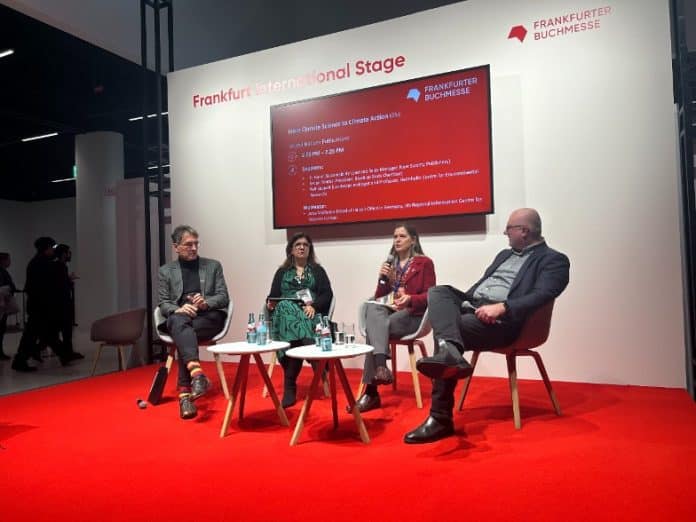At the 2024 Frankfurt Book Fair, the United Nations hosted a series of impactful panel discussions, delving into the power of storytelling, the role of the publishing industry in climate action, and the global fight against disinformation. These events demonstrated how literature and publishing can influence some of the most pressing challenges of our time – defending human rights, protecting the planet, and safeguarding the integrity of information.
The highlight of the UN’s presence at the Fair was the panel titled “Storytelling is a Human Right,” which focused on the stories of exiled authors who use their writing to resist oppression and document injustices. The panel featured voices such as Uighur poet Aziz Isa Elkun, Sudanese author Stella Gaitano, Russian writer Dmitry Glukhovsky, and Armenian-German author Corinna Kulenkamp.
Aziz Isa Elkun, who has lived in exile in London since 2001, delivered an emotional reading of his poetry dedicated to his mother and the Uighur people, urging the international community to act against China’s repression of Uighurs, where mass incarcerations in concentration camps have been reported. He emphasized the importance of bearing witness, even from afar, saying, “Even if it’s very far away, we must not turn a blind eye.”
Stella Gaitano, a Sudanese author now based in Germany, spoke about her mission to record the genocide in Sudan. For Gaitano, writing is a powerful tool to document the crimes against her people and ensure that these atrocities are not forgotten, especially since many of the perpetrators have yet to be brought to justice. “We will not forget,” she said, stressing the role of literature in the pursuit of justice.
Outspoken criticism of the war in Ukraine
Russian author Dmitry Glukhovsky, who is exiled for his outspoken criticism of the war in Ukraine, expressed frustration with those who defend authoritarian regimes. He argued that while understanding dictators is important, it should be done with the goal of resisting them, not excusing their actions. Glukhovsky highlighted the destructive impact of Putin’s war not just on Ukraine but on the Russian people themselves.
Corinna Kulenkamp shared how her novel about the Armenian genocide became eerily relevant in 2023 when Azerbaijan’s human rights violations forced thousands of Armenians to flee once again. The past, she explained, is still very much alive, and the shadow of her ancestors’ story continues to influence her life and writing.

Sugarcane for book printing
In addition to the human rights-focused panel, the UN hosted two other vital discussions. The panel “From Climate Science to Climate Action” explored how the publishing industry can contribute to global biodiversity and climate protection efforts. Prof. Ralf Seppelt from the Helmholtz Centre for Environmental Research in Leipzig argued that while addressing climate change is crucial, it is equally important to highlight positive stories and successful initiatives to inspire further action in protecting biodiversity. Sevani Matos, President of the Brazilian Book Chamber, and EJ Hurst, Sustainability Lead at New Society Publishers in Canada, discussed the industry’s responsibility to adopt sustainable practices. They presented the innovative use of sugarcane as a sustainable alternative for book printing, underscoring how the publishing world can reduce its environmental footprint while contributing to global climate goals.
Curbing Mis- and Disinformation: The UN Global Principles for Information integrity
The third panel, “Getting Back to the Facts: How to Protect Information Integrity,” focused on the growing threat of disinformation and the tools available to combat it. Sherri Aldis, UNRIC Director, explained the newly adopted Global Principles for Information Integrity, which aim to curb the spread of mis-, and disinformation, particularly in politically sensitive contexts. She highlighted how the UN itself has been a target of disinformation campaigns, citing instances where UN Peacekeepers in the Democratic Republic of Congo were falsely accused of wrongdoing. Aldis stressed that disinformation not only undermines trust in institutions but also poses real risks to peace and security.
Caroline Lindenkamp from CORRECTIV, a non-profit investigative newsroom, introduced her interdisciplinary project noFake, which combines the expertise of scholars, developers, and journalists to create new strategies against disinformation. noFake leverages civic tech for both “prebunking” (preventing disinformation before it spreads) and “debunking” (correcting false information after it surfaces).
All panels underscored the diverse ways in which the publishing industry, authors, and the global community can tackle some of the world’s most urgent challenges – from protecting human rights and combating climate change to fighting the wave of disinformation that threatens democratic societies.
The UN’s presence at the Frankfurt Book Fair highlighted the organization’s commitment to these causes. As we confront global challenges, the power of words and responsible publishing will continue to play a key role in shaping a more just and sustainable world.




